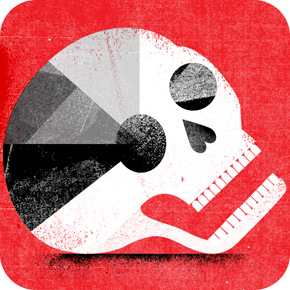
Okay, for the record, this is not a joke. You may have thought it was enough to have moments of existential terror while off your mobile devices. Say, standing before a mighty ocean or amid a fall landscape. It can even happen while sitting at a stop light or getting off the elliptical–you know, those “What’s the point?” moments, where you have an interrupting self-appraisal of the elemental stuff of life. “What am I doing all this for,” you ask yourself, “when someday I’m going to die?”
Well, now you don’t have to wait for these moments to assault your plans, there’s an app for it. Days of Life is a downloadable counter of what kind of time, on average, you have left this side of Jordan. A digitized pie chart shows you, with a green-orange ratio of Life Left versus Life Irretrievably Spent, how many days you have left until someone like you dies, a continual motivator to, I guess, carpe diem. But, as the New Yorker contributor Mark O’Connell describes, much more seems to be going on, like the immense guilt which stems from time wasted, and the false and absurd sense of control we seek, lended here by one’s statistical sense of even their own demise. A downloadable reminder meant to embrace the void is, I suppose, only making it another predictable way to, as the Great Prophet says, “avoid the void“…
There are, for me, two major sources of fascination with this app. The first is the way in which its visual design recalls the experience of playing a video game, where your character’s vitality is represented by a system of symbols at the bottom of the screen—a decreasing lineup of little hearts, say, or a pulsing red level to warn of perilously dwindling life force. Days of Life’s orange and green pie chart makes a similarly stark statement, but instead of encouraging you to run around looking for a turkey leg to devour or a vial of magic potion to knock back, its intention is to make you consider your own mortality and to want, as a result, to spend your remaining time as wisely as possible. What that means these days, of course, is “productivity.”
And this is the other thing I find most fascinating and disturbing about the app: the brutally frank way in which it encapsulates a particularly fraught aspect of our relationship to technology. When I look at that little pie chart of my remaining days, I see my life represented as a kind of product, a consumer good with a timeline of built-in obsolescence. The imperative is to get as much use-value out of yourself as you can, while you can. (When you click on “About” in the app, you read this: “Many entrepreneurs have achieved success after recognizing that life is short and every minute counts. Use this app every day for motivation and to set short and long term goals.”)
I waste a lot of time agonizing over the amount of time I waste; I am preoccupied to the point of obsession with my various failures to achieve self-optimization, with the idea that I have too little time, and I am producing too little with it. (One of the ironies of being a writer—or working in any kind of creative area, I suppose—is the tendency to conceive of yourself in oddly dehumanizing ways: as “productive” or “unproductive,” as laboring toward some kind of Stakhanovite ideal of efficiency and yield.) At a rate of about once per second, my word processor’s cursor blinks at the end of the last word typed. If I look at it for long enough, I begin to imagine it ticking (“Write! … Write! … Write!”) as it counts down the remaining time—before a deadline, before I have to leave my desk to pick up my son from child care. Before I’m dead.
Days of Life is one of those technologies that seems to incidentally satirize our relationship with technology more broadly. It sits in the “Productivity” folder on my iPhone’s home screen, along with my calendar and a to-do list app called Remember the Milk, but it would be as appropriately housed in a folder called “Existential Terror.” So much of what we value in technology is its promise to upgrade the hardware of our lives, to make us more useful to ourselves—more productive, more profitable, more effective. Days of Life functions like a reductio ad absurdum of the logic of personal productivity. The pie chart becomes a special way of being afraid: an image of the self as a micro-economy of numbered days.
[youtube=http://www.youtube.com/watch?v=h_izWbQZSFU&w=600]

COMMENTS
2 responses to “Do You Have the Death App?”
Leave a Reply














What the?! I just had a panic attack reading this!
This is serious. You gotta read PZ’s Panopticon!